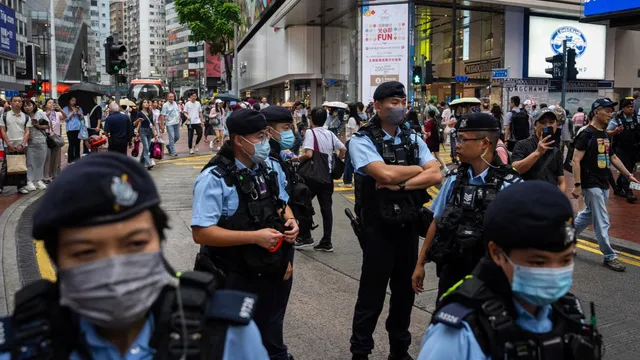
China cracks down on suspected colluders in joint operation
2025-06-13 02:51- China's national security authorities and Hong Kong police conducted a joint operation targeting six individuals.
- The operation involved high-profile raids, seizures of documents, and the restriction of travel for the suspects.
- This action marks an intensified crackdown on dissent in Hong Kong, coinciding with the anniversary of the national security law.
Express your sentiment!
Insights
In a notable escalation of national security enforcement, China's national security authorities in Hong Kong, along with the local police, conducted their first publicly acknowledged joint operation. This operation involved raiding the residences of six individuals who are under suspicion for colluding with foreign entities to jeopardize national security. The operation took place following the enactment of the controversial national security law imposed by Beijing in 2020, which has since been utilized to target numerous activists and critics of the government. The police announcement, made late Thursday, did not reveal the identities of the individuals nor the specific organization involved in these alleged violations, emphasizing that investigations are still in progress. Officers also conducted searches at the office of the involved organization, seizing various exhibits, including bank documents and electronic devices that may further aid the investigation. The six individuals who were targeted in the raids were required to surrender their travel documents, effectively restricting their movement as part of the ongoing investigation. Since the national security law was implemented, numerous prominent activists, including Joshua Wong, have faced prosecution, with Wong being recently charged under the law again, potentially facing life imprisonment for his alleged conspiracy to collude with foreign forces. This operation seems to mark an increase in local enforcement efforts just as the fifth anniversary of the national security law approaches. The Hong Kong authorities have intensified their focus on activities deemed as secessionist while claiming to safeguard stability in the region. This approach includes the scrutiny of various platforms that allegedly promote anti-government sentiments, such as a mobile gaming application that authorities accused of advocating armed revolution. Beijing and Hong Kong officials argue that such stringent measures were necessary to restore order and security following widespread protests that occurred in 2019, as public discontent grew against the central government's encroachment on local autonomy. The upsurge in operations and the recent charges against activists reflect a broader crackdown on dissent and a rapid decline in political freedoms in Hong Kong since the national security law's enactment.
Contexts
The impact of the National Security Law (NSL) on Hong Kong activism has been profound and multifaceted, reshaping the landscape of civil liberties and political dissent in the region. Enacted on June 30, 2020, the NSL has criminalized various acts deemed subversive or threatening to national security, including secession, sedition, and collusion with foreign forces. As a result, the law has instilled a climate of fear among activists, suppressing their willingness to express dissent formally and engage in protest activities. Many prominent pro-democracy figures and organizations have disbanded, and public gatherings have significantly dwindled, reflecting an environment increasingly hostile to free expression. This legal framework has not only restricted the operational space for local activists but has also prompted a chilling effect on the general populace, who may self-censor their opinions and actions to avoid repercussions under the law. The NSL has led to a significant increase in arrests and prosecutions of individuals associated with activism. Since its implementation, numerous activists and protest leaders have faced charges ranging from incitement to violence to terrorism, often characterized by the authorities as acts undermining state security. Well-known figures, such as Joshua Wong and Benny Tai, along with various civic organizations, have been embroiled in legal battles or have gone into exile, further diminishing the resistance movement within Hong Kong. As a consequence, civil society's capacity to mobilize for social change has been severely restricted, leading to a significant curtailment of political pluralism and the erosion of democratic structures that were once a hallmark of Hong Kong's governance. Internationally, the imposition of the NSL has drawn widespread condemnation and prompted various governments to reassess their diplomatic and trade relations with China. Countries such as the United States have instituted sanctions and revoked special trading privileges in response to the perceived erosion of Hong Kong's autonomy and freedoms. This geopolitical context has not only punctuated the urgency of the situation but has also mobilized international advocacy efforts aimed at supporting Hong Kong's pro-democracy activists and preserving their rights. The NSL, therefore, serves not only as a tool of domestic repression but as a flashpoint in Sino-Western relations, complicating matters on the global stage as governments navigate their responses to an increasingly assertive China. In conclusion, the National Security Law has fundamentally altered the fabric of activism in Hong Kong, paving the way for a more repressive political climate that stifles dissent and civil liberties. The repercussions of this legislation extend beyond local boundaries, impacting international relations and raising questions about human rights and the rule of law in the region. As activists adapt to this challenging environment, the ongoing struggle for democracy and autonomy in Hong Kong faces significant barriers. The future of activism in Hong Kong remains uncertain, as the interplay between domestic policies and international responses continues to evolve.